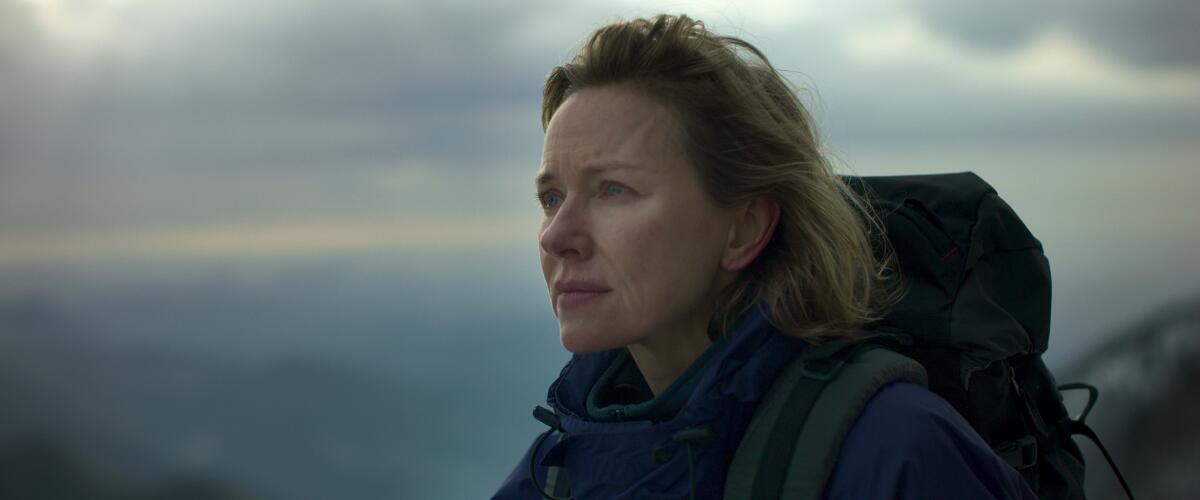Harrowing Naomi Watts rescue drama ‘Infinite Storm’ lacks emotional punch

- Share via
Talk about harrowing. “Infinite Storm,” the true-life story of New Hampshire nurse and mountain climber Pam Bales (Naomi Watts), who saved the life of a despondent, ill-prepared hiker (Billy Howle) stuck in a horrific blizzard, contains a propulsive array of startling, riveting and death-defying moments.
For about half of this superbly shot, effectively mounted film, it’s a you-are-there look at one woman’s intrepid quest to fulfill her duties as a local search-and-rescue team member against some staggering odds. And Watts, no stranger to hard-fought tales of survival (see her Oscar-nominated turn in 2012’s tsunami tale “The Impossible” and her fine work in 2020’s powerful “Penguin Bloom”) brings a stripped-down grit and flinty resolve to her arresting portrayal.
For your safety
The Times is committed to reviewing theatrical film releases during the COVID-19 pandemic. Because moviegoing carries risks during this time, we remind readers to follow health and safety guidelines as outlined by the CDC and local health officials.
Watts’ and Howle’s characters go through hell and back as they attempt to escape the White Mountains’ treacherous Mount Washington, (the Slovenian Alps subbed for New Hampshire), and reach safe ground before illness and injury can claim the desperately weakened young man known only as “John.” (Bales never learns his real name, nor does he offer it, so she makes one up.)
It’s part of the movie’s intrigue, yet also one of its drawbacks, that we learn so little about Bales and, especially, John throughout so much of the story.
For Bales, a few hints are dropped at the start during some friendly banter with a local café owner (Denis O’Hare), as well as via several warm flashbacks that unfold featuring her two angelic young daughters.
But without sufficient introduction, investing in this solitary mountain guide as a flesh-and-blood character can feel more reflexive than authentic. Who wouldn’t root for someone as seemingly capable, diligent and well-meaning as Bales in the face of such extreme hardship? We’re so diverted by how she’ll extract herself from such nightmares as falling into a deadly ravine — twice, no less — and so many other travails along this pummeling obstacle course, that biographical details can easily take a backseat. But they didn’t necessarily have to.
It may be baked into the actual story, but John’s cipher-like quality, added to the character’s hypothermia and dazed, near-suicidal reluctance for help, sometimes reduces him to more of a prop than a persona. He remains largely a mystery until the film’s conclusion in which both he and Bales finally open up to each other — and to the audience. It makes for a cathartic, poignant scene; yet even then, there’s a somewhat lean, almost tacked-on quality to their revelations.
This spare approach informs much of the screenplay by Joshua Rollins, who was drawn to the Bales’ fraught tale after reading Ty Gagne’s lyrically-titled essay, “Footprints in the Snow Lead to an Emotional Rescue.” Unfortunately, the script’s sparseness too often bleeds into the dialogue which, at times, sounds remarkably wan. (“You OK?” is asked of the so-not-OK John so often during the rescue that it can feel as if Watts is simply grabbing for the nearest two words.)
Polish director Malgorzata Szumowska, who helmed and co-wrote 2020’s hypnotic and transporting “Never Gonna Snow Again” (hardly the message here!), stages her action sequences with muscular authority as blinding snowfall and 50 mph gale winds are vividly recreated. Still, there’s a hauntingly stark quality to even the movie’s most turbulent scenes, all stirringly enhanced by co-director Michal Englert’s icy lensing.
Add in the brave, emotionally naked performances of Watts and Howle, (so good opposite Saoirse Ronan in 2017’s “On Chesil Beach”), and quibbles aside, this is a daring and memorable depiction of trauma, compassion and resilience.
As for the film’s title, it’s taken from a quote by environmental philosopher John Muir who wrote, “The whole universe appears as an infinite storm of beauty.” He apparently never had to survive an inclement day atop Mount Washington.
'Infinite Storm'
Rated: R, for some language and brief nudity
Running time: 1 hour, 37 minutes
Playing: Starts March 25 in general release
More to Read
Only good movies
Get the Indie Focus newsletter, Mark Olsen's weekly guide to the world of cinema.
You may occasionally receive promotional content from the Los Angeles Times.










